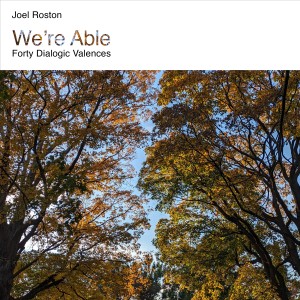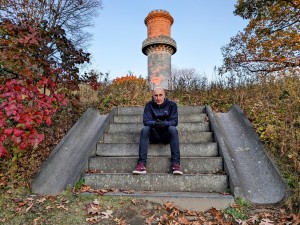
Artist
IMAGES: To download, click above. Photo credit to Jordyn Bonds.
Joel Roston
Joel Roston’s We’re Able (Forty Dialogic Valences) is a suite of forty short pieces written for the solo classical guitar and performed on a stereo electric guitar.
Each piece on We’re Able—through varying strategies primarily related to part-structure, pitch organization, texture, and dynamics—is representative of two human beings attempting to collaborate/find common ground with one another through dialogue. To that end, each discrete, numbered valence in the suite perhaps best understood or approached more as a conversation than as a piece of music. The content of each conversation is inconsequential; the focus, instead, is on the degree to which the participants are successful or not in empathizing with and understanding one another.
We’re Able’s conversations sharply came into focus over the past few years, when Roston—in an effort to more deeply understand how, why, and when society chooses to dehumanize certain individuals or groups—was speaking, at length, with ex-members of Peoples Temple, all of whom were relatives, family members, or close friends of those who lost their lives in the tragedy at Peoples Temple Agricultural Project/Jonestown, Guyana on November 18th, 1978.
Peoples Temple members occupy a very particular space in our society; they’re archetypally maligned, dehumanized, dismissed, and disregarded as impressionable, easily-influenced, mindless group-thinkers who’d rather “drink the punch” than think critically about themselves or the world. Just like every other person on earth, however, Peoples Temple members are complex, conflicted, emotional beings attempting to find their place in the world. They’re also, perhaps unsurprisingly, some of the easiest people to talk with about the epidemic of dehumanization that plagues our species.
Leveraging a formal education in classical guitar performance—along with a history as an instrumentalist which ranges from angular, whole-tone metal outfit, Big Bear, to MIT’s Balinese gamelan ensemble, Gamelan Galak Tika, to Tyondai Braxton’s Central Market ensemble—We’re Able represents a struggle with and love for the guitar as much as it represents a struggle with and love for humanity. To that point, in addition to studies in interpersonal collaboration, many of the album’s pieces can be taken as stand-alone studies inguitar technique. A deep love of rigidly-structured, contemporary composition coupled with a lifetime obsession with pop music (which started with his mother’s rock n’ roll pop-quizzes at age four) conspire with one another to create Roston’s personal, musical language, which is nearly platonically expressed in the forty valences of this new work.
While unambiguously tonal, We’re Able’s conversations twist and turn themselves in ways that yearn for a simple diatonicism, but, ultimately, find themselves lost in a fragmented, harmonically ambiguous landscape. The kinds of rare, collaborative, thoughtful dialogic valences present in conversations with ex-Peoples Temple members are not so easily identifiable in We’re Able’s compositions. As in real life, however, they do pop up from time to time at discrete moments in the suite.


